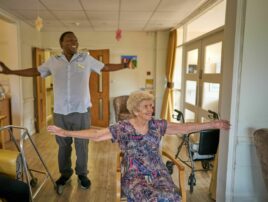
Tuesday 18th January 2022
Battling the January gloom
Louise Morse
Christmas with its sparkle is behind us. The decorations are down and so are our spirits. Declaring 17 January as ‘Blue Monday’ was a marketing ploy used by a travel agency to sell sun-soaked holidays to those of us struggling through the dark months, and the myth stuck because it described it so well! But we don’t have to give in to winter depression - there are ways of lifting our spirits. Joining in favourite Christian praise with Alexa or on YouTube is one way or finding something that makes you laugh. A study last year suggested that older people might like comedian Michael McIntyre. A round-up of advice from experts, including this psychotherapist, has some practical things you can do.
Let there be light! We get up in the dark in the morning and go back to bed in the dark. And the days are usually gloomy (though there have been some crisp, sparking hours lately.) It makes us feel half awake and dozy. It’s because the pineal gland responds to the dark and produces melatonin, a serotonin-derived hormone that promotes sleepiness so for dark winter days we may not be firing on full power. Our brains react to light so try to have as much light as possible and there are special lights available that work well for many people, designed to alleviate a condition known as Seasonal Affective Disorder – SAD. So, turn up the lights.
Count your blessings! It sounds old-fashioned but it works. Turning your mind to the good things widens your perspective and stops you going down your dark rabbit hole. ‘Rejoice always, pray continually, give thanks in all circumstances; for this is God's will for you in Christ Jesus,’ says 1 Thessalonians 5:16-18.
Practise gratefulness – similar to counting your blessings. Studies show that being grateful releases feel-good hormones in our brains. Write on scraps of paper the things you are grateful for and put the scraps in an attractive jar or box, so you can go through them again and again.
Pay attention to what you are thinking. Negative feelings arise from negative thoughts or images. If you have a persistent negative thought, for example, that you will never amount to much, or you are not a good person (quite a common thread) ask yourself where is the evidence for that? Put that thought on trial and find the evidence for, and the evidence against it. The evidence must be factual, not feelings.
Turn your mind to others. Send uplifting texts to your friends and family or phone them. Just knowing that someone is thinking about them can lift them up too. Our brains have a neuronal mirroring feedback and doing good leads to feeling good. Look up our new project campaign #friendshipisageless and get involved.
Look forward to a small treat. (I call it having a hot chocolate moment.) It could be relaxing in a scented bath at the end of the day or having a cup of your favourite coffee. For many of us it’s as simple as sinking into a book with a cup of tea - a good book takes you into many different worlds and reading about the heat of the sun is sometimes so good you can feel it.
Break the lethargy barrier: Find one job that you’ve been putting off, say, tidying a cupboard or your desk, and do it. No matter how small or boring, afterwards you will feel a sense of achievement.
Don’t forget to exercise. Even a small amount of exercise releases endorphins that are feel-good hormones. Walking is star-rated but doing a burst of energetic housework is often just as good.
Breathe properly. Most of the time our breathing is very shallow, and we’re not fully oxygenated. Learn to breathe from your diaphragm. Put you hand on your middle and push it out by breathing in – pull it in by breathing out.
Eat well but avoid emotional eating. Eat mindfully, slowly, savouring each mouthful.


































